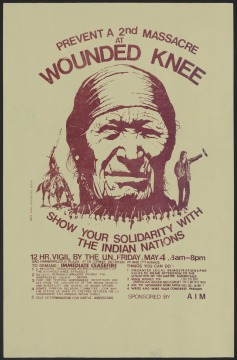1973: American Indian Movement occupies Wounded Knee
Members of the American Indian Movement occupy a trading post at Wounded Knee, South Dakota, on the Pine Ridge Reservation. The conflict originated in an attempt to impeach the chairman of the Oglala Lakota Tribe. But as the tribe split into armed camps, tribal police and government, federal law enforcement, and many outside parties became involved. The siege lasted 71 days, resulted in the deaths of two Indians, and captured national media attention.
“The 1973 conflict at Wounded Knee involved a dispute within Pine Ridge’s Oglala Lakota Tribe over the controversial tribal chairman Richard Wilson. Wilson was viewed as a corrupt puppet of the BIA by some segments of the tribe, including those associated with the American Indian Movement. An effort to impeach Wilson resulted in a division of the tribe into opposing camps that eventually armed themselves and entered into a two-and-a-half month conflict that involved tribal police and government; AIM; reservation residents; federal law enforcement officials; local citizens; nationally prominent entertainment figures; national philanthropic, religious, and legal organizations; and the national news media. When the siege ended on May 9, 1973, two Indians were dead and an unknown number on both sides were wounded, including casualties among federal government forces.” —Alvin M. Josephy, Joane Nagel, and Troy Johnson, editors, Red Power: The American Indians’ Fight for Freedom, 1971
- Theme
- Native Rights
- Region
- Great Plains
“Show your Solidarity with the Indian Nations,” poster from Wounded Knee occupation, 1973
Courtesy Library of Congress
“Remember Wounded Knee,” poster showing Bobby Onco, a Kiowa, and member of the American Indian Movement (AIM), ca. 1973–1980. The original photograph was taken after a ceasefire agreement was reached between AIM forces and federal marshals at Wounded Knee.
Courtesy Library of Congress

